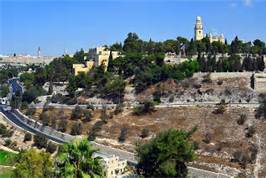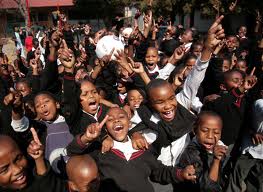Isaiah 52:7-10
This is one of my favorite passages in the whole Bible. "How beautiful
on/upon the mountains are the feet of those who bring good news..."
The picture Isaiah presents is of a king, or a monarch, a sovereign coming to
town. The town is Zion, Jerusalem, which was devastated and destroyed and the
people carried to exile in Babylon. When the temple was destroyed, the meeting
place for God and His people, God left too. What remained was only
desolation.
And now, we see this picture of God returning to Zion. If you have watched on
TV or seen in real life when a monarch or head of state visits a town, there is
usually a lot of communication that goes on. Messages are relayed –
electronically today – about every move. The crowds that assemble the route pass on information, on twitter or facebook and even take pictures and transmit them to those who are not lucky to be there.
The difference is that those in this passage did not have twitter or facebook. But they positioned themselves on hill tops and mountains where they could see the convoy – or motorcade if you like – below them. They passed on information to those yet to be reached by the sovereign. Essentially, they served as lookouts.
Today too, when the President or Queen of England, visits a town, those along
the route consider themselves lucky and to be part of history. That is why they
convey their experience..
So, in our passage: Who are these lookouts or messengers on the mountains and hill top? They are anybody who happens to be there and cares to be a lookout. And what is the good news? It is the return of God to Zion. The desolation is over and God reigns again.
I was blessed with parents who valued education. I remember, growing up, my dad was always writing something in his diary. He liked pens, an obsession I must have inherited from him because I instinctively collect pens.
He made two claims which sounded plausible but lacked proof or evidence. One was that he had been a teacher. I say "had been" and that is the basis for plausibility. In the villages a teacher was a title for life. Long after they left the classroom, teachers remained teachers and carried the title "mwalimu" in Swahili. Thus the first President of Tanzania was Mwalimu Julius Nyerere because that was what he was before going into politics and even after retirement from politics, he remained mwalimu until he died.
The question about dad's claim was the school where he taught. We were unable to find independent verification, but he claimed he taught writing – not what we call writing today – but the alphabet for beginners at a parish school. That school was no longer in existence. But he had the obsession with writing, and he was the most literate of his age group. That made his claim plausible.
The second claim was how he helped the establishment of our village parish. In his own words, he claimed, "I brought the parish here!" .
Dad enrolled us in school without discrimination. My oldest sister was the first girl in the village to go to Middle School – boarding schools in those days – and the other three sisters followed suit in time. It was remarkable because girls' education was considered time wasted. Their place in life was marriage. What would they do with the education anyway?
My father often walked us to school and came to walk us home after school. That was very unusual. But there were bullies on the way and that was the reason for the escort. The nearest school from home – about a mile away – was a Roman Catholic school. Our family was Lutheran, so we could not attend that school. We went to a public school about two miles away past the Catholic school. Going past the Catholic school was like crossing a war zone – that was how it felt like.
Parents never allowed their kids to come home whining about trouble on the way. "Fight back an attacker", they urged. "If you lose a fight today, look for a better opportunity tomorrow; but don't come home whining. That is how you learn in life".
Dad was different on that philosophy. He escorted us to and from school, for protection.
I was watching an Independent Lens program on PBS (halfthesky) when I heard one of the women in the program make this remark: "The mothers have not changed. But the children have. They are in school and the mothers are happy". The title of the program was " Turning Oppression into Opportunity for Women Worldwide".
That remark reminded me of my own mother, for that was her story and the story of most women in the villages. Mothers held families together at a huge sacrifice that children did not understand growing up. Even where there was abuse – and that was too common – mothers stuck around for the children. The major source of income for the inhabitants of Kilimanjaro was coffee. Every household owned a plot of land which supported coffee, a cash crop, and various crops for domestic use. Everyone in the household worked in the "shamba" as it is known in Swahili. Come harvest time and only the male – the husband, father – had ownership and control. It was not uncommon that women never knew how much income came from coffee sales. It was not uncommon either that the mothers and children never shared in the income for which they labored all year round. Although the "shambas" gave us most of the produce we needed for food, there was still much that had to be bought in stores: cooking oil, meat, salt. Sometimes we had milk, most times we had to buy it. We had bananas and sweet potatoes, but not rice, and sometimes no corn either. Cash was needed for paraffin for lighting and clothes were produced in factories, not at home. Thus, mothers sold some commodities in the market – or at home – for cash for some necessities. That is how they also provided for their children. Looking back, I now realize how stressful Christmas-time was fro my mother. It was time for new clothes and she took me to the market. She said I could have one shirt, a pair of shorts and a pair of shoes, no more. As I made my selections, I always found something else I wanted, may be a second nice looking shirt, or a sweater. She said no, only one shirt; so I cried in the market, and she was embarrassed. She went through this with each of her children – eight of us – every year until we were able to support ourselves. This was the story of most mothers. You may be wondering: Where were the men and the money from the coffee produce? That story later.
Drinking was a major social activity in the villages on the slopes of Mt. Kilimanjaro. It was an integral component of village social life before it became a problem. Actually the problem was not drinking but not being part of the drinking community.
I started hearing of drinking as a problem in the pastor's sermons. They are the best sermons I still remember, more than fifty years later. I don't recall him preaching about anything else: "There is no house", I can almost hear his voice rising, "with skinny cows, a skinny dog, a skinny cat, and skinny children, like a house ruled by alcohol".
A few years later, I would hear the same condemnation in most speeches made by the then President of Tanzania:"Walevi na wazururaji" - drunks and loiterers - were targeted in most of his speeches.
We made the drinks at home, from bananas and millet. Some people had a "good hand" and their brew was always popular. Indeed, popularity was essential in the general social fabric of village life. If it came from expertise in brewing, it was as good as the school teacher's or even the pastor's.
There were many and varied reasons for brewing and coming together to drink. Well, one of them was for popularity. The more often people came to your house simply to drink the more popular you became. Then there were anniversary celebrations. Local family courts also imposed fines of drinks to a guilty party – mostly a spouse - in a dispute.
Often husbands brought cases to the clan elders against their wives when "they refused to give them bananas". Often too, the wife was found guilty and fined "ten gallons of pombe" to reconcile with her husband and compensation for the elders who sat in judgment.
In short, alcohol was plentiful and for many occasions. There were also "clubs" where anyone who did not want to wait on charity could buy his/her fill.
Two things were considered a problem: Drinking alone and not drinking at all. Also, there was no age limit. As soon as a baby was able to suckle milk, the baby could drink alcohol. (This is in theory only and parents did not generally feed alcohol to infants). Nevertheless, by age six to eight, most children were regularly drinking alcohol.
In those days when I was growing up, alcohol addiction was an unknown concept. That there were "walevi na wazururaji" and many who wasted all their resources – time, talent and treasure – to alcohol was indisputable. The sermons in my local church and the President's admonitions were addressed to people deemed to be morally weak. Most people never saw the problem of alcohol.
Five or six years ago I read a lot that was written about the Episcopal
Church. It was all negative. There were stories about disagreements within the
Episcopal Church and with the Anglican Community. There were churches breaking away from the U.S body and joining other jurisdictions in Canada or as far away as Nigeria.
At that time, if anybody would have asked me if I would become an
Episcopalian I would have thought he/she must have been out of his/her mind.
Some of the stories even suggested that God was not in the Episcopal
Church!
Two years ago, I was looking for a church with week-day worship because I was
not able to attend Sunday worship due to my work schedule. I don't remember
exactly how I found out that Christ Church Cathedral had mid-day services on
Wednesdays and Fridays. Most probably I was in one of the organ recitals when I came across The Cathedral Tower.
That first Wednesday, after the worship service, Canon Nancy Jones asked me
if I was visiting. I explained that I only wanted somewhere I could attend
weekday worship. "We are glad you are here", she said.
The following Friday Canon Joanna Leiserson asked if I was visiting. "He was
here on Wednesday", Jim George interjected.
"Well, I wasn't here on Wednesday", Joanna said.
Again we talked for a few seconds. She said, "We are glad you are
here".
Over the next two years, I became part of the Wednesday and Friday afternoon
worshipers. On most occasions, after the Lessons we spent a few minutes in
discussion. To my surprise, not once did I hear mentioned any of the negative
reports I had read so much about not so long ago. It appeared as though nobody
had ever heard of them.
In those two years I attended the Lenten and Advent Lecture
Series. I loved them. Then one day Nancy or Joanna mentioned the Men's
Bible Study on Thursday mornings. I attended it the next Thursday and have
looked forward to it every week since. It just felt like a group tailored for
me!
During these two years, nobody once asked me if I wanted to join the
Episcopal Church. The familiar sentence was: "We are glad you came. Do come
back".
Yet, whatever worship service or activity I participated in at Christ Church
Cathedral, I just felt to be part of it. I felt like I had always been there.
The people around me made me feel like I was always part of the group.
After two years, I said to myself – like the Ethiopian said to Philip -
"Look, here is water. Why shouldn't I be baptized?" (Acts 8:36). But I
had been baptized in the Lutheran Church, so I really said, "Why shouldn't I
join this community?"
I did; during the Great Vigil of Easter on April 7, 2012.
|





 RSS Feed
RSS Feed